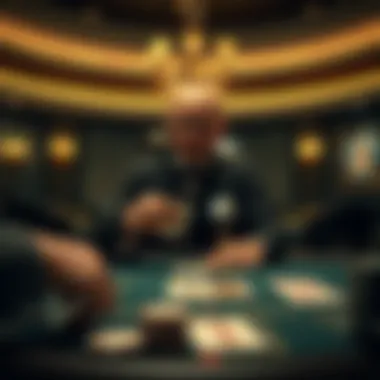Exploring the Intricacies of Blackjack Cheating


Intro
In recent years, the game of blackjack has become a battleground not only of skill but also of ethics and legality. Cheating in this popular casino game is a topic cloaked in shadow, full of intricate dynamics and controversial practices. The motivations behind a player's decision to gamble dishonestly can be as varied as the methods they employ. From the psychological aspects that drive individuals to cheat, to the advanced techniques and technologies that facilitate this behavior, the landscape of blackjack cheating is complex and multifaceted.
Gambling is often romanticized, portrayed as a thrilling endeavor that paves the way for potentially life-changing wins. Yet, within this thrill, more often than not, comes a darker underbelly. Understanding the fine line between fair play and deceitful tactics is paramount for anyone involved in the gambling world, whether they're casual players or seasoned strategists. As we dissect the various elements surrounding blackjack cheating, we also uncover the implications for individuals, casinos, and the industry at large. It is crucial for all players to grasp the significance of ethics as they navigate a world where the risks of dishonesty could spell disaster.
Game Mechanics and Strategies
Understanding the nuances of blackjack requires more than just knowing how to place a bet. The rules are deceptively simple, yet the tactics can be extensive. Delving into these mechanics can provide insights not just into fair play, but also into how cheating can take root.
Understanding the Rules of Popular Games
At its core, blackjack revolves around acquiring card totals as close to 21 as possible without exceeding it. Each player competes against the dealer, rather than against each other, creating a fascinating dynamic. The dealer's hidden card could potentially change everything. If a player doesn’t grasp the basic rules, they are vulnerable to pitfalls – and it is here where some might be tempted to bend the rules. Understanding the mechanics is crucial not only for genuine play but also for recognizing when something feels off at the table.
For example, many new players might lack awareness about basic strategy charts that detail the optimal plays for every possible hand. Failing to know these strategies can lead a player to make choices that could be exploited by more experienced individuals who might use unscrupulous methods.
Advanced Strategies for Winning
While many dabble in casual play, others turn to advanced strategies as a means of gaining the upper hand. Card counting is one such method often discussed in hushed tones. It involves keeping track of the ratio of high cards to low cards remaining in the deck. Using this knowledge, players can adjust their bets and gameplay in their favor.
However, engaging in such strategies begs the question: where does one draw the line? The intent can often blur, leading some to cross over into outright cheating, utilizing additional resources like electronic devices or colluding with others at the table. Engaging in a conversation about these advanced strategies calls for a delicate balance between celebrating skill and acknowledging the pitfalls it may invite.
Understanding Blackjack
In grasping the full extent of cheating in blackjack, one needs to first appreciate the intricacies of the game itself. Blackjack is more than just a card game played in dim casinos; it is a rich tapestry woven with history, strategy, and player psychology. Understanding blackjack provides both context and a frame of reference that illuminates why some players might be tempted to cheat.
The Origins of Blackjack
Blackjack, originally known as ‘Twenty-One’, has roots that stretch back to 17th-century France. Historical accounts suggest that the game evolved from a French game called Vingt-et-Un. It didn't gain its modern name until the game made its way to the United States in the early 20th century, where it became popular among gamblers eager to beat the house. While the game’s mechanics have remained, its cultural significance has evolved. Today, blackjack is a staple in gambling resorts, bringing in a diversity of players from around the world.
Basic Mechanics of the Game
At its core, blackjack is played against the dealer rather than other players. Each participant receives two cards, and the aim is to get as close to 21 as possible without going over. Picture this: you're seated at a felt-covered table, the cards gleaming under soft lighting. The dealer deals the first round, and players weigh their options, considering the value of their hand against what the dealer might hold.
The beauty of blackjack lies in its blend of chance and skill. An insightful player calculates odds, uses strategies like splitting pairs or doubling down, and adapts based on previous rounds. In contrast, someone skimming the rules might just be fishing for luck. This distinction in gameplay forms the crux of why cheating can tempting. A seasoned blackjack strategy can give a player the illusion of control, making the act of cheating feel like just another gamble.
Popularity and Cultural Impact
Blackjack caters to a variety of people. From high-rollers whispering strategy to new players hesitantly hitting for another card, the energy at a blackjack table is palpable. Movies like Las Vegas and 21 have romanticized the game, leading to a surge in interest among youth. It’s often depicted as a battle of wits against the dealer, infusing the game with a narrative that captivates.
This cultural fascination extends beyond Hollywood. Online platforms have created virtual tables where players risk real money from the comfort of home. Moreover, blackjack tournaments draw competitors eager to showcase their skills, solidifying the game's status as not only a test of luck but a fair ground for experts. The constant flux of the game keeps it alive, relevant, and inviting to anyone willing to hit the felt.
Understanding the roots and mechanics of blackjack isn't merely a preamble; it sets the stage for the complex motivations and techniques surrounding the act of cheating.
As the world of blackjack unfolds, it reveals layers of human behavior, decision-making, and risk-taking. This provides a backdrop against which the act of cheating can be scrutinized. With such rich ground to cover, the next sections will delve into the reasons behind the allure of cheating, and the tactics that emerge when the stakes get high.
The Psychology Behind Cheating
In the infinitely complex world of blackjack, where every player hopes to take home a bit of the pot, the psychology behind cheating emerges as a crucial subject. Understanding what drives players to cheat not only sheds light on their motivations but also helps casinos and regulators strategize for preventing such practices. Cheating in blackjack isn’t just about being cunning with cards; it involves deep-seated psychological factors, including risk perception, moral disengagement, and cognitive biases.
Motivations for Cheating


The motivations for cheating in blackjack can be as varied as the players themselves. Some are driven by the thrill of the gamble — the rush that comes from bending the rules to tilt the odds in their favor. Others may be motivated by necessity; perhaps they find themselves in dire financial straits and see cheating as a quick way out.
- Financial Gain: Many players think that a little cheating can lead to substantial return on investment, especially in high-stakes environments.
- Peer Influence: The social environment can sometimes encourage cheating. If a player notices others bending the rules without immediate consequence, they may feel compelled to join in.
- Lack of Moral Constraints: Some players engage in rationalizations that their cheating is harmless or that the casino “owes” them for all the money they’ve lost in the past.
Knowing these motivations is essential for developing effective interventions to deter cheating in blackjack.
The Mindset of a Cheater
Understanding the mindset of a cheater can be just as revealing as examining their motivations. Most importantly, they often employ a psychological tactic called moral disengagement. This occurs when individuals convince themselves that their actions are justified. They might think, "Everyone else is doing it," or, "The casino makes enough money and won’t miss a few chips."
Cheaters may also develop:
- Compartmentalization: They separate their cheating behavior from their everyday moral standards. To them, cheating at blackjack is a game strategy, not an ethical lapse.
- Confidence in Deception: Many cheaters tend to believe they can outsmart the system, which fosters a sense of invincibility. This can lead them to take larger risks over time.
This mindset can create a vicious cycle; as they cheat successfully, they become more entrenched in their behaviors, believing that they can evade detection indefinitely.
Impact of High Stakes on Decision Making
High stakes games create a breeding ground for risky behavior. In moments where the potential payout is enormous, players are more likely to engage in cheating to secure their financial future. When everything is on the line, even the most prudent players might find themselves second-guessing their moral compass.
- Heightened Stress Levels: Under the pressure of significant losses or gains, individuals are more prone to impulsive decisions. This can lead to a higher likelihood of cheating as they seek immediate relief from their pivotal situation.
- Desensitization to Risk: With increased exposure to high-stakes gambling, individuals might develop a skewed perception of risk. What once felt morally unacceptable may seem like a standard operating procedure in their mind—"just a part of the game."
- Temporary Rationalization: Players often tell themselves that it's a one-off event, that they will "never do it again" once they've won back their losses. Such temporary rationalizations make it easier to cross the line into cheating.
"When the stakes hit rock bottom, morality might not even step in to lend a hand; after all, it’s survival of the fittest in the casino jungle."
In summary, while the act of cheating in blackjack might easily be dismissed as a simple moral failing, the underlying psychology is far more intricate. By dissecting the motivations, mental frameworks, and the ramifications of high stakes, we can begin to understand the complex dynamics in play. This understanding is critical as casinos and regulators strive to maintain both the integrity of the game and the interests of honest players.
Types of Cheating Techniques
In the world of blackjack, where skill meets luck, cheating techniques have evolved, becoming increasingly sophisticated. Understanding these tactics is crucial, not only for casinos and regulators but also for players who aim to maintain the integrity of the game. This section delves into various forms of cheating, illuminating the methods that some individuals employ to gain an unfair advantage.
Card Marking and Stacking
Card marking and stacking are among the oldest tricks in the book. In card marking, players make subtle alterations to the cards to identify them without the need for memory or skill. Methods vary from using invisible ink to simply bending corners. Such techniques create a significant disadvantage for other players and violate the spirit of fair play.
Stacking involves manipulating the deck to ensure favorable hands for specific players. A skilled dealer or accomplice can subtly position desired cards into play. The illicit gains from these tactics can be substantial; however, the risks are likewise considerable as casinos employ advanced surveillance systems to detect such practices.
Collusion Among Players
Collusion is a more intricate form of cheating where two or more players work together to manipulate the outcome. This can manifest in various ways, such as signaling to each other about their hands or sharing strategies throughout a game. While legal in some informal settings, collusion in casinos is strictly prohibited and can lead to severe consequences if exposed.
Players engaging in collusion often do so with advanced tactics like using coded language or gestures. The success of their strategy depends heavily on their communication skills and ability to blend in, but when it works, the rewards can be fat. This makes detection even harder for casinos, as they must analyze patterns of play for unusual collaborations.
Technology-Assisted Cheating
In today's digital age, technology-assisted cheating has become a prominent concern for casinos worldwide. This method ranges from devices that can signal players about card values to using sophisticated software to calculate optimal strategies in real-time. With smartphones are now ubiquitous, the temptation for players to rely on apps and hidden devices has soared.
While the odds of getting caught have increased with improved security measures, so have the ingenuity of cheaters. Casinos have implemented various countermeasures, including signal-blocking technology and increased use of artificial intelligence for monitoring gameplay.
The Role of Professional Cheaters
Professional cheaters represent a unique subset in the world of gaming. These individuals operate with a high level of skill and sometimes even recruit players to assist in their exploits. With techniques honed over years of experience, professional cheaters can exploit even the tiniest holes in a casino’s defense, making them both feared and respected.
Their methods may include sophisticated scheming, psychological tactics to manipulate dealers and other players, and advanced card counting strategies. For them, it’s not just about financial gain; it’s also a game of wits and strategy against a machine well-versed in odds. The challenge, the thrill, and the eventual downfall they face when caught paint a complex picture of what drives these professionals.


Cheating in blackjack is not just about winning money; it’s a calculated risk that can lead to reputational and legal consequences.
As we delve further into these techniques, it is essential to remember that the allure of cheating often fades when the risks outweigh the rewards. Understanding these dynamics is imperative for players who want to engage in a fair and genuinely competitive atmosphere.
Legal and Ethical Considerations
Understanding legal and ethical considerations in gambling, particularly in blackjack, is crucial. It not only affects the players but also underpins the very framework of the gambling industry itself. The stakes are high, and the repercussions of cheating ripple throughout the community, impacting everything from trust in casinos to the livelihoods of individuals working within the industry. Engaging in dishonest practices can lead to dire consequences, but it also raises necessary ethical questions about fair play and personal integrity.
Laws Against Cheating in Gambling
Gambling regulations are put in place to ensure fair play and protect both players and casinos. Laws vary widely across jurisdictions. In many places, firmware modifications or the use of physical devices to alter card games are felonies. For instance, in Nevada, the state legislates against any form of deception in gambling which includes card marking, shuffling techniques, or collusion.
Modern technology has complicated these laws. Some places have begun to outlaw the use of smartphones to gain an advantage as well. The Gambling Commission in the UK, for example, has delineated clear guidelines around cheating and its consequences. Violating these laws can lead to hefty fines, imprisonment, and permanent bans from casinos.
Consequences of Cheating
The fallout from cheating in blackjack is severe and multifaceted. Once caught, players often face immediate ejection from casinos, alongside legal ramifications. Additionally, the implications can extend well beyond the incident itself. Players might find themselves blacklisted across multiple establishments, hindering future gambling endeavors. Furthermore, the financial losses incurred are but a fraction of the potential damage to one's reputation, which in many environments, may never recover.
Cheating doesn't only impact the cheater. Casinos experience a erosion of trust among regular patrons. When incidents of dishonesty become public knowledge, it can lead patrons to question the legitimacy of everything happening within the establishment. Trust is hard-earned in the gambling world and can be lost in the blink of an eye.
"In the gambling business, integrity is the coin of the realm."
- Unknown
The Importance of Fair Play
Fair play is the bedrock of any game – blackjack included. It ensures that everyone is on equal footing, and that victory is determined by skill, luck, and strategy. When players choose to cheat, they not only undermine their fellow players but also diminish the value of their own victories. Winning through legitimate means is infinitely more satisfying and is core to the ethos of gaming as a whole.
Moreover, the focus on fair play fosters a healthy casino environment that encourages responsible gaming practices, which, in return, benefits all stakeholders – players, operators, and regulators alike. It's essential that players recognize this principle, and understand that while the allure of cheating may be there, the long-term costs outweigh any temporary gains.
In sum, the legal landscape surrounding blackjack and gambling operations mandates strict adherence to established regulations, while ethical considerations revolve around maintaining a fair and level playing field. The realities of cheating present notable consequences that extend well beyond the tables, highlighting the need for ethical conduct rooted in integrity.
Impacts on the Gambling Industry
The gambling industry is a colossal machine, raking in billions each year, and it's no surprise that it faces various challenges that could affect its overall health. Cheating, especially in undeniably popular games like blackjack, is one of the significant concerns for operators, enthusiasts, and players alike. Grasping the impacts of cheating can help stakeholders navigate the fine line between maintaining gaming integrity while ensuring profitability. Here, we dive into the key aspects surrounding financial implications, repercussions for casinos, and the evolving regulatory landscape spurred by these dishonest practices.
Financial Losses Due to Cheating
Cheating leads to considerable financial drain on casinos, which ultimately affects profits. The staggering truth is that casinos are not just venues for entertainment; they are businesses. Therefore, any financial loss due to unfair practices can directly impair their economic stability.
Some of the predominant areas where financial losses creep in include:
- Loss of Revenue: When cheaters win unfairly, casinos lose out on legitimate revenue. High-stakes games can see thousands being siphoned away through coordinated cheating efforts or scams.
- Increased Security Costs: As cheating rates rise, so does the investment in security and surveillance. Casinos often find themselves needing more advanced tools and personnel to monitor games effectively.
- Legal Fees: When cheaters are caught, legal repercussions can ensue, which may involve lengthy lawsuits and settlements.
In many instances, a single cheating incident can spiral into a significant hit for a casino's earnings, causing them to rethink their operational strategies for the future.
Repercussions for Casinos
The consequences of cheating extend far beyond just financial losses. Casinos, as pillars of the gambling landscape, need to think about their reputation and customer trust. Some repercussions include:
- Diminished Player Trust: The presence of cheating can deter honest players, who may feel that their chances of winning are compromised. If word spreads that a casino does not adequately protect against cheating, it can lead to dwindling participation.
- Negative Publicity: Media coverage of cheating scandals can tarnish a casino’s image, yielding bad PR that might repel potential customers.
- Operational Changes: Casinos often have to revamp their rules, alter layouts, or change personnel as a means to combat cheating, which can lead to operational inefficiencies.


The impact on the gambling ecosystem means that casinos must be proactive about ensuring that their gaming environments are secure and fair, maintaining their standing as trusted destinations for entertainment.
Changing Regulations in Response to Cheating
The evolving nature of cheating has forced the gambling industry to adopt stringent regulations. Regulatory bodies often work hand-in-hand with casinos to craft laws that protect the integrity of gaming. Here are some trends in regulatory change:
- Stricter Surveillance Requirements: More comprehensive monitoring techniques are now mandated, such as the installation of high-definition cameras and more extensive player tracking systems.
- Collaboration with Law Enforcement: Casinos and local law enforcement agencies often partner to curtail organized cheating, sharing information and tactics to tackle the issue head-on.
- Updated Licensing Procedures: The process for obtaining a gaming license has become increasingly complicated, requiring applicants to demonstrate robust security protocols against cheating.
Moreover, when casinos adapt to such regulations, they can create a safer environment for players, boosting confidence in their operations. As a result, these legal adaptations ultimately fortify the gambling industry against those who seek to exploit it for personal gain.
Strategies for Responsible Play
When delving into the world of blackjack, it is crucial to outline the significance of responsible play. Understanding how to engage with the game in a thoughtful and calculated manner offers not just an enhanced experience, but also reduces the risks associated with gambling. Responsible play allows individuals to enjoy blackjack while minimizing the temptation to resort to unethical practices like cheating.
Engaging in blackjack should be a form of entertainment, not a desperate attempt to recoup losses or achieve an unattainable financial goal. Establishing clear strategies guides players to remain disciplined and focused.
Building a Solid Blackjack Strategy
To build a solid strategy, one must first grasp the basic mechanics of the game. This means knowing the rules inside out, familiarizing oneself with different variations of blackjack, and comprehending key terms such as "hitting," "standing," and "splitting."
An effective strategy often starts with a predetermined budget for the gambling session. By setting limits, players can avoid getting swept up in the moment, a common pitfall that leads to aggressive gambling behaviors. Here’s a simple list of steps for building a solid strategy:
- Know your limits: Decide on a budget that you can afford to lose without it impacting your financial well-being.
- Practice basic strategy: Familiarize yourself with optimal plays for every possible hand using a strategy chart. This foundational knowledge gives players an edge.
- Choose the right games: Look for tables with favorable rules that enhance your odds, such as those that pay 3:2 for blackjack rather than 6:5.
- Stay sober: Alcohol can cloud your judgment, leading you to make impulsive decisions. Consider playing with a clear mind.
Understanding Game Mechanics to Minimize Losses
Understanding the game mechanics is vital for any serious player aiming to minimize losses. Blackjack is unique in that it allows players to make decisions to influence the outcome, unlike many other casino games that rely purely on luck.
By recognizing how the dealer plays and the odds of various outcomes, you can make informed decisions. For example, knowing when it is statistically safer to hit or stand can significantly elevate your chances of winning. This knowledge of probability not only enhances game enjoyment but translates into better financial management over time.
Additionally, it's worthwhile to be aware of the rules specific to the table you’re playing at. Different casinos may have variations in rules that affect the house edge. Understand factors like:
- Dealer hits on soft 17: This is crucial because it impacts the expected return.
- Payouts for blackjack: Stick to tables that offer standard payouts.
Recognizing the Temptation to Cheat
It’s easy to fall into the trap of cheating, especially under pressure or in high-stakes situations. Recognizing this temptation is the first step toward maintaining integrity in gameplay. The allure could come, for example, from a large potential payout that feels impossible to resist. However, succumbing to these urges can lead to dire consequences, both ethically and legally.
Players must always remember that the thrill of the game diminishes if flashy shortcuts are taken. Some effective strategies to overcome the temptation include:
- Reflection: Before you act, take a moment to ask yourself how you would feel about your decision later.
- Accountability: Sharing your experiences with friends or fellow players can provide perspective and discourage unethical behaviors.
- Focusing on fun: Remember that gambling should be enjoyable. Setting personal goals that prioritize fun over profit can keep your motivations in check.
"The best way to deal with the temptation to cheat is to eliminate the mindset that winning is the only reason to play." When players embrace responsible strategies, they nurture a healthier approach that prioritizes enjoyment and integrity, ensuring that the game remains a source of fun without the shadow of deceit hovering over their heads.
The End
The discussion surrounding the complexities of cheating in blackjack is crucial for both gamblers and casinos alike. Understanding the motivations that drive individuals to cheat is just as important as grasping the legal and ethical implications. This article aims to equip readers with a nuanced perspective on these matters, highlighting that cheating is not merely a shortcut but a risk-laden gamble of its own.
The Path Forward for Gamblers and Casinos
Moving forward, both players and casinos should prioritize a commitment to integrity and transparency. The preservation of fair play benefits everyone involved in the gaming experience. Here are several key considerations:
- Adopting Robust Security Measures: Casinos must invest in advanced surveillance technology and training for personnel. Enhanced monitoring systems can deter potential cheaters and inspire confidence among honest players.
- Educating Players: Gamblers must be informed about the consequences of cheating, which can range from legal issues to being banned from their favorite establishments. Knowledge is power, and fostering an environment of awareness can deter dishonest behaviors.
- Open Dialogue: Casinos should entertain discussions about the challenges posed by cheating. Fostering a community around responsible gaming helps build trust and encourages players to engage ethically.
- Flexible Game Rules: To mitigate risk in a world where cheating can arise, casinos might consider adaptive gameplay rules that discourage potential cheating methods without stifling the player experience.
"Investment in stakeholder education and transparency could pave the way for a healthier gambling industry, reducing the temptation to cheat while enhancing the thrill of the game."
Promoting fair play not only protects the legitimacy of blackjack but fosters a vibrant, trustworthy gambling environment. By iterating on these concepts, both casinos and players can work towards a more honest future where the allure of cheating is overshadowed by the joy of fair competition. In the end, the game should remain a test of skill and strategy, not a playground for those willing to risk it all for an unfair advantage.
For more insights on strategies and responsible gaming, consider visiting resources such as Responsible Gambling Council or National Council on Problem Gambling.















